The 20 Best Mosquito Repellents to Keep Your Family Protected
Updated: Aug. 02, 2023
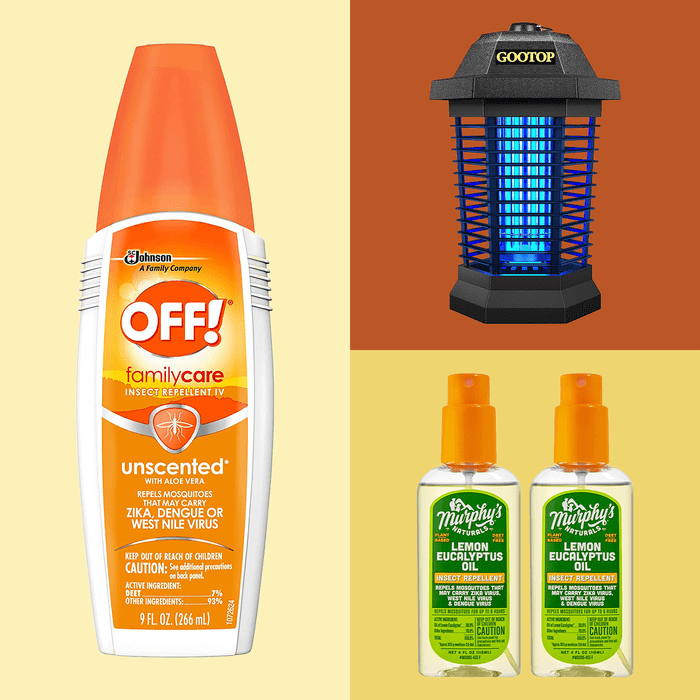
We found the best mosquito repellent products for bite-free summer adventures.
Our editors and experts handpick every product we feature. We may earn a commission from your purchases.
The sweet summer months are upon us, which means picnics in the park, fun BBQ ideas, backyard games, days at the pool…and mosquitoes. Whether or not you live in one of the most mosquito-infested cities in the U.S., if you consider your backyard an oasis and love to lounge on outdoor furniture, chances are you’ll get bitten. That’s where the best mosquito repellent products come in.
Mosquitoes can ruin even the most gorgeous patio decor scenes and leave you itching and scratching for days. Luckily, there are plenty of safe and simple ways to keep mosquitoes at bay, from mosquito-repellent plants and natural bug repellents to mosquito repellent clothing, lawn treatments and EPA-approved bug sprays. The challenge is to pick the right one.
“When choosing a personal repellent, make sure you match your insect repellent to the environment you are going to be in, as well as your activity,” says Tania Elliott, MD, an internist, allergist and immunologist. “Different repellents offer a varied range of active ingredients, strengths, and lengths of protection.”
Keep in mind: “The higher the percentage of the active ingredient (i.e. DEET), the longer one application will last,” Elliot adds. Choosing a longer-lasting formula may prove useful, especially in areas with extended warm seasons that allow mosquitoes to live longer.
Key ingredients to look for in a bug spray
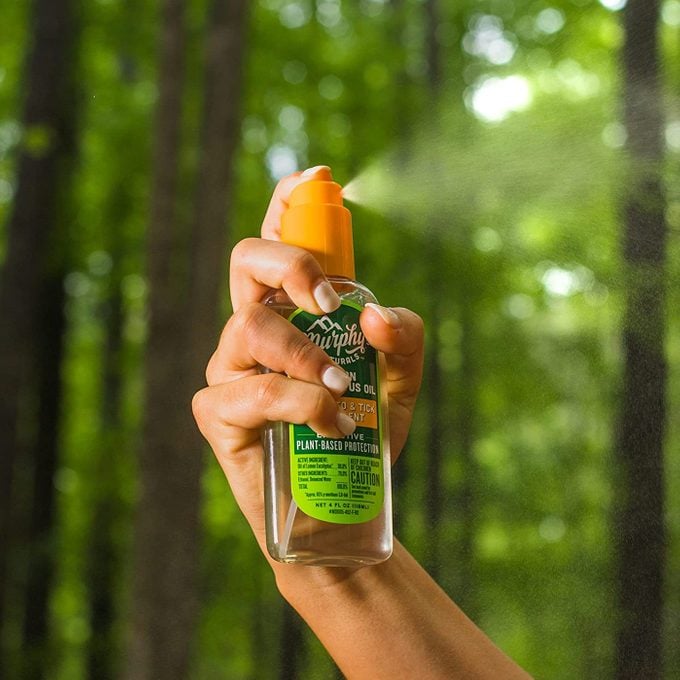
The best mosquito repellent you use in your yard should not be the same kind you use on your body.
For skin:
According to the U.S. Centers for Disease Control and Prevention (CDC), these mosquito repellent ingredients are EPA-approved and safe for use—even by pregnant or breastfeeding women:
- DEET, which is suitable for babies over two months
- Picaridin
- Oil of lemon eucalyptus (OLE), which is not suitable for kids under the age of three
- Para-menthane-diol (PMD), which is not suitable for kids under the age of three
- 2-undecanone
For yards and large areas: The above ingredients won’t be as effective in large spaces. These are the recommended active ingredients for large-scale adult mosquito treatments in residential settings:
- Pyrethrins
- Permethrin
- Piperonyl butoxide
How to properly apply bug spray
“Many people don’t know how to properly apply personal insect repellent,” Elliot notes—because yes, there’s a “right” and “wrong” way to do it. “It’s best to put it on your hands first, then rub the repellent in to ensure you don’t miss any spots,” she explains. “This is especially important to remember if you have kids,” she says. Just don’t forget to wash your hands afterward!
Also, if you’re using both sunscreen and bug spray, the CDC recommends applying the sunscreen first and the mosquito repellent second.
Best overall mosquito repellent
OFF! FamilyCare Insect & Mosquito Repellent Spritz
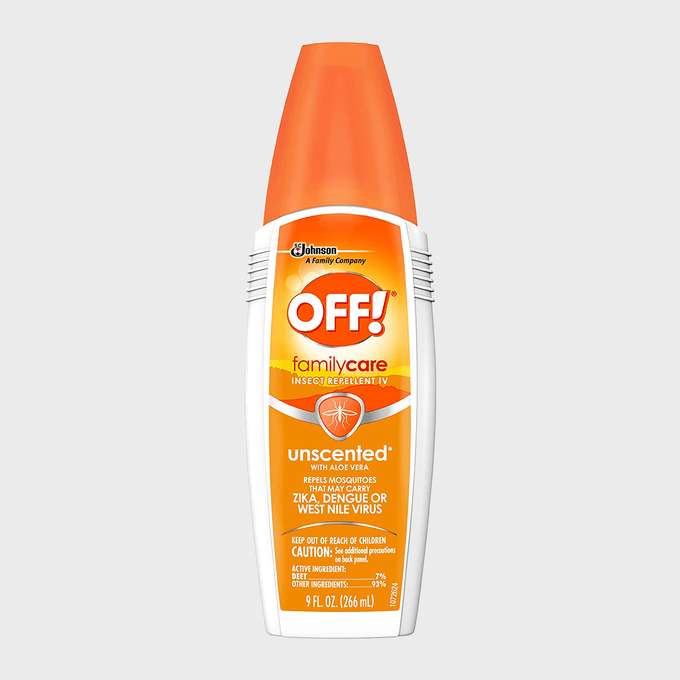
The reliable DEET formula of OFF! FamilyCare Insect & Mosquito Repellent Spritz and easy-to-control spritz bottle make it a shoo-in for the overall best mosquito repellent. It’s non-greasy, minimally scented to mask any DEET odor and works on almost any type of outer clothing fabric without damage. With thousands of positive ratings and an affordable price point, keeping a bottle on hand for adventures outdoors is always a good idea.
Pros:
- Strong 7% DEET formula
- Added aloe vera
- Minimal scent
- Affordable price
- Designed to be spritzed on almost every type of fabric without damage
- Non-greasy
Cons:
- Not designed to be applied directly to skin—spray on fabric instead.
Best mosquito repellent for hikers
Sawyer Products 20% Picaridin Lotion Packets
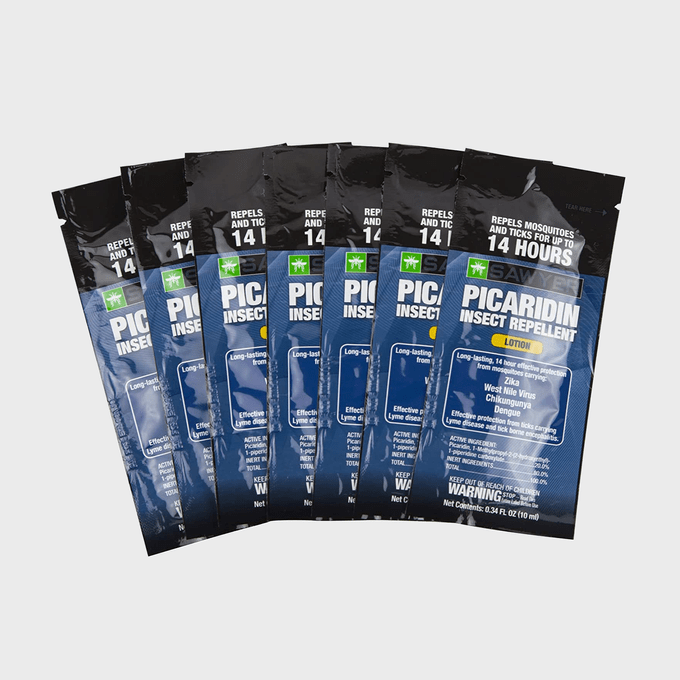
Never worry about bug spray bottles taking up valuable space in your hiking pack thanks to Sawyer Products 20% Picaridin Lotion Packets. With over 35,000 Amazon ratings and a nearly-perfect 4.5-star average, customers can’t stop raving about how easy and fast they apply and soak into skin. They’re also a cinch to travel with—even in airport carry-on bags and hiking backpacks where every ounce counts. Expect the built-in long-lasting mosquito and tick repellent lotion to work for up to 14 hours against mosquitoes.
Pros:
- Easy-to-carry lotion packets
- Affordable price point
- Strong 20% Picaridin mosquito repellent
- Safe for use directly on the skin (for both adults and children)
- Formula isn’t sticky and dries quickly
Cons:
- These lotion packs are not ideal for treating fabrics or clothes
Best spray repellent for wooded areas
OFF! Deep Woods Insect Repellent
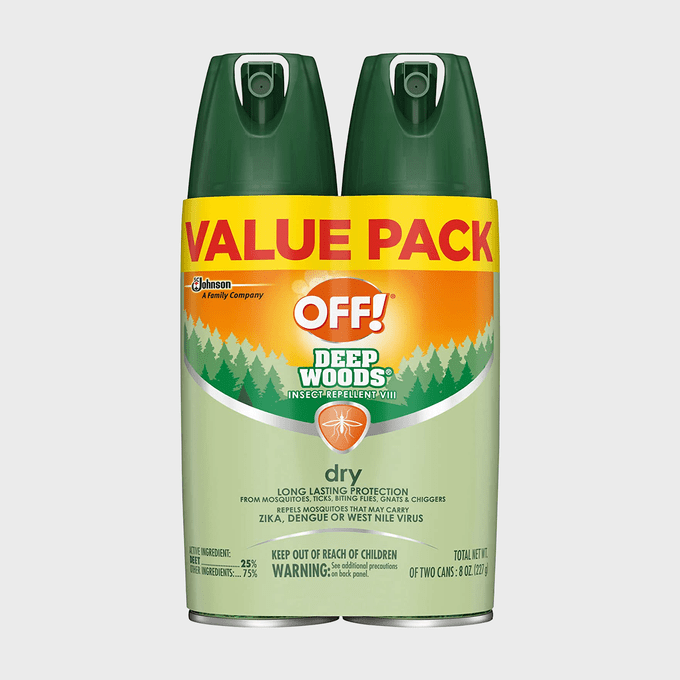
Reviewers can’t rave enough about OFF! Deep Woods Insect Repellent. We agree. The easy-to-apply spray can is lightweight and easy to carry, while the non-greasy 25% DEET formula works for hours on end to repel several types of bugs. It’s one of the strongest and best mosquito repellent products on our list, making it an ideal choice for camping, hunting and exploring.
Pros:
- 25% DEET formula offers extremely strong protection for even the most heavily-wooded areas
- Powder-dry non-greasy formula
- Easy-to-handle spray can
- Long-lasting protection
- Affordable
- Over 27,000 Amazon ratings with a nearly-perfect 4.6-star average
Cons:
- Aerosol delivery is an environmental concern for many
Best mosquito repellent pellets for landscaping
Bonide Mosquito Beater
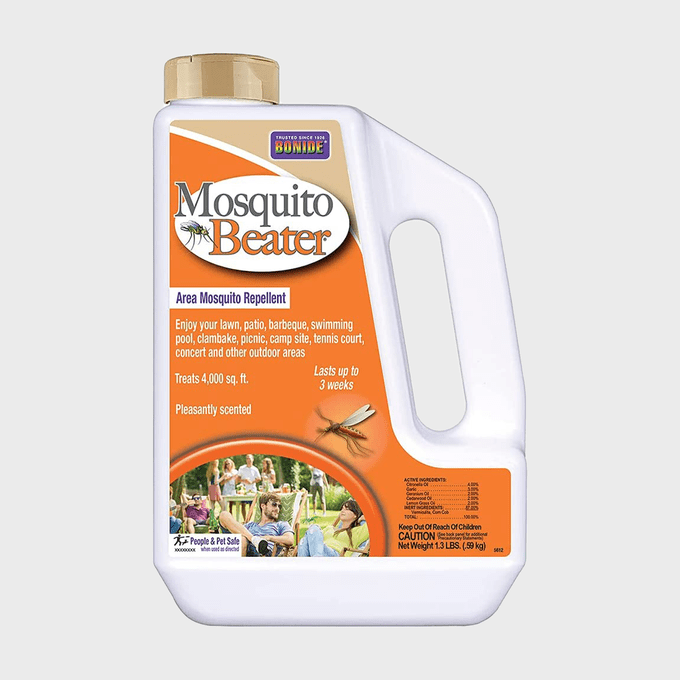
Each jug of Bonide Mosquito Beater is brimming with easy-to-distribute mosquito repellent granules that offer slow-release technology. Sprinkle them around your plants, yard and other outdoor areas that are prone to bugginess. Within an hour, they’ll go to work repelling mosquitoes and other bugs with a gentle scent. They work for up to three weeks and won’t damage your yard.
Pros:
- Granular formula is easy to distribute and lasts for weeks
- Can be placed nearly anywhere in your yard for long-lasting protection
- Gentle scent
- One large jug treats up to 4,000 square feet
Cons:
- Not ideal for areas with small pets and children playing on the ground
Best mosquito repellent incense
Murphy’s Naturals Mosquito Repellent Incense Sticks
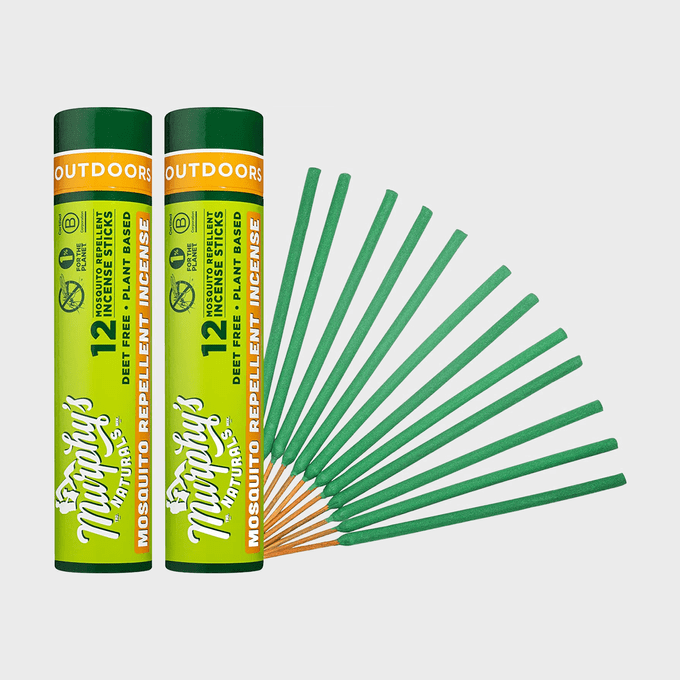
These DEET-free Murphy’s Naturals Mosquito Repellent Incense Sticks are a favorite for families, patio dining and those with sensitive skin. They’re a cinch to light and require absolutely no skin contact. The formula is made of natural plant oils that repel several types of bugs including the gnarliest mosquitoes.
Each stick provides 2.5 hours of protection in a 12-foot area. Rosemary, peppermint, citronella, lemongrass and cedarwood oils are the hero ingredients rather than intense synthetic chemicals. Using small amounts of essential oils is one of the reasons you never see mosquitoes at Disney World despite its swampy Florida location.
Pros:
- DEET-free, family-safe formula delivered by slow-burn incense sticks
- No skin or clothing contact
- Uses the power of plant-based essential oils instead of synthetic chemicals
- Repels mosquitoes for up to 2.5 hours at a time
Cons:
- Relatively small protection range of 12 feet means using a few sticks to cover a deck or patio area
Best mosquito repellent shirt
L.L.Bean Insect Shield Shirt
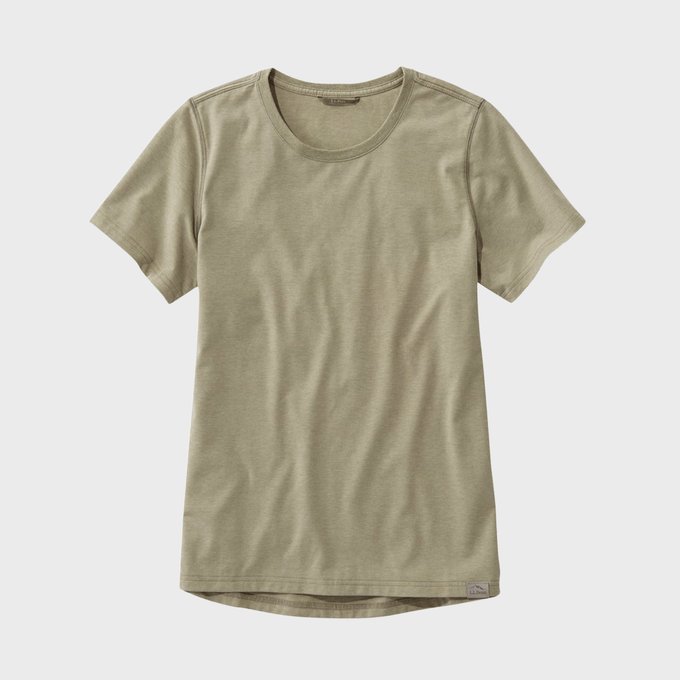
Layering your wardrobe with insect-deterring pieces is one of the simplest ways to cut down on mosquito exposure. This L.L.Bean Insect Shield Shirt offers EPA-approved material treated with permethrin to last through months (or even years) of wear and up to 70 washes before losing its mosquito-fighting edge.
We love its comfortable wear and moderate price point. It’s even available in several colors that may help you avoid mosquito bites. It also comes in a handsome men’s version that features the same mosquito-repelling technology.
Pros:
- Looks and feels like a regular tee, but is treated with EPA-approved permethrin to deter mosquitoes and other bugs
- Bug repelling qualities last up to 70 washes
- Comes in both women’s and men’s styles
- Affordable price point
- Neutral colors
- Sizes XS through XL
Cons:
- No plus-size offerings
Best mosquito repellent tech gadget
Thermacell Mosquito Repellent Lantern
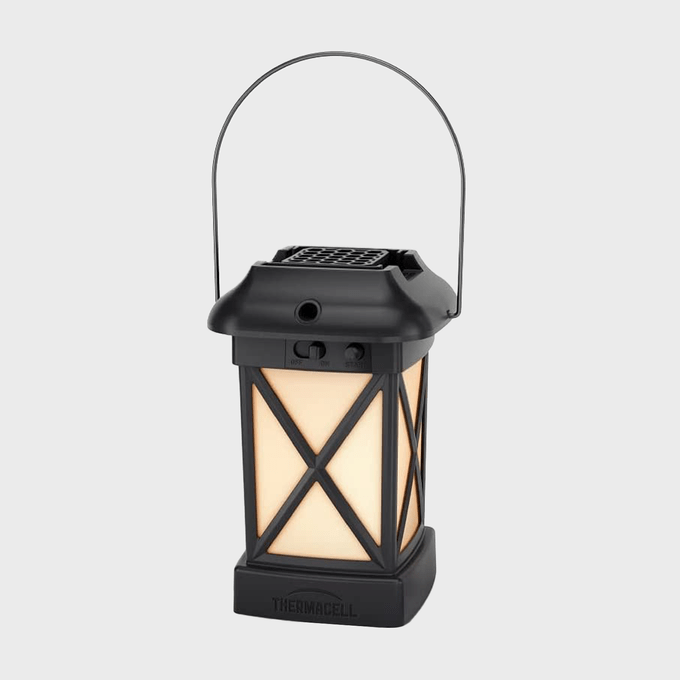
Add a Thermacell Mosquito Repellent Lantern to your tech gifts wish list for this year. It’s easily one of the most brilliant and best mosquito repellent devices we have seen yet. The spray-free delivery looks and acts like gorgeous outdoor lighting, and it creates a 15-foot zone of protection against mosquitoes.
The functional light feature is ideal for nighttime gatherings on the deck, by a firepit or for sipping sunset drinks on the patio. The plant-based repellent formula is EPA-reviewed for safety and is both people- and pet-friendly. The lantern is smoke and flame-free, never gives off strong scents and offers maximum protection in as little as 15 minutes. P.S. If you like this, consider the Thermacell Portable Mosquito Repellent, too.
Pros:
- Modern technology makes this handsome lantern a mosquito-repeller nobody expects
- People- and pet-safe
- Creates a 15-foot protection zone
- Function light is ideal for evening gatherings
- Moderate price point
- Easy refills
Cons:
- Can only be used with Thermacell refills, which are easy to get online but hard to find locally if you’re in a pinch
Best mosquito repellent backyard spray
Cutter Backyard Bug Control Spray
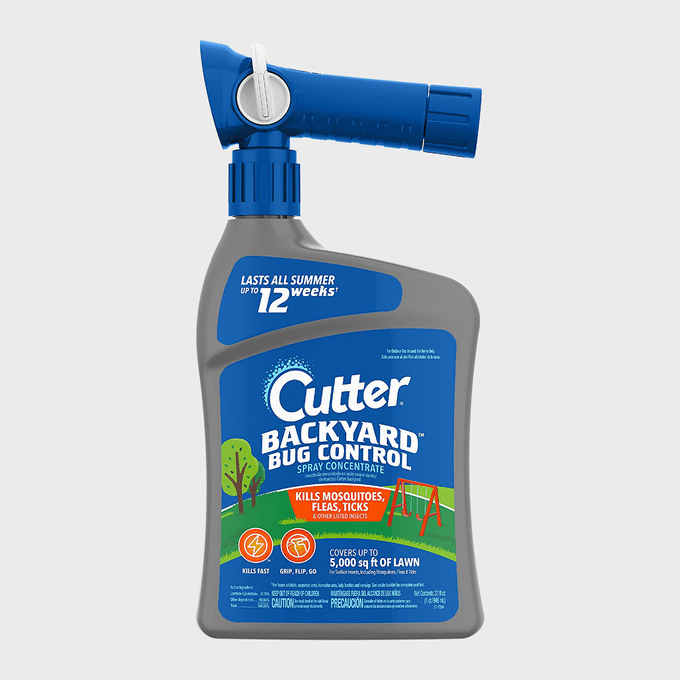
Simply attach a bottle of Cutter Backyard Bug Control Spray to your garden hose and cover the parts of your yard you want to treat. The hose-end sprayer is activated with a quick flip and controls bug infestations for up to 12 weeks. Aside from just repelling mosquitoes, it also gives ants, beetles and other critters the boot. A single bottle treats up to 5,000 square feet of lawn.
The best part? No mixing is required. Just hook it up to your garden hose, no mixing or aeration required to make the perfect blend.
Pros:
- Convenient spray format
- Attaches to any standard garden hose
- Affordable treatment lasts for up to 12 weeks
- A single bottle treats up to 5,000 square feet of lawn
- No mixing required
- Both repels and kills bugs
Cons:
- Works best if used early in the season before major infestations start, though it is still somewhat effective mid and late-season. You may need a second or third treatment if you’re late to the mosquito-treating game.
Best mosquito repellent candle
The Pioneer Woman Citronella Candle

While other mosquito repellent candles may offer stronger concentrations of citronella oil, we like The Pioneer Woman Citronella Candle’s versatile indoor and outdoor use. It comes with an effective three-wick design and a beautiful vintage-inspired ceramic exterior that makes it one of the best hostess gifts. It also features a bonus essential oil, cinnamon, for a light and inviting scent that offers a mosquito-repelling double whammy.
Pros:
- Citronella candle can be used both indoors and out
- Three-wick design
- Gift-worthy, vintage-inspired ceramic base
- Wax formula contains both citronella and cinnamon essential oils
- Very affordable
Cons:
- Not the strongest citronella concentration, but works nicely and offers the right amount of protection in a variety of small spaces
Best mosquito repellent with sun protection
Avon Skin-So-Soft SPF 30 with Bug Guard
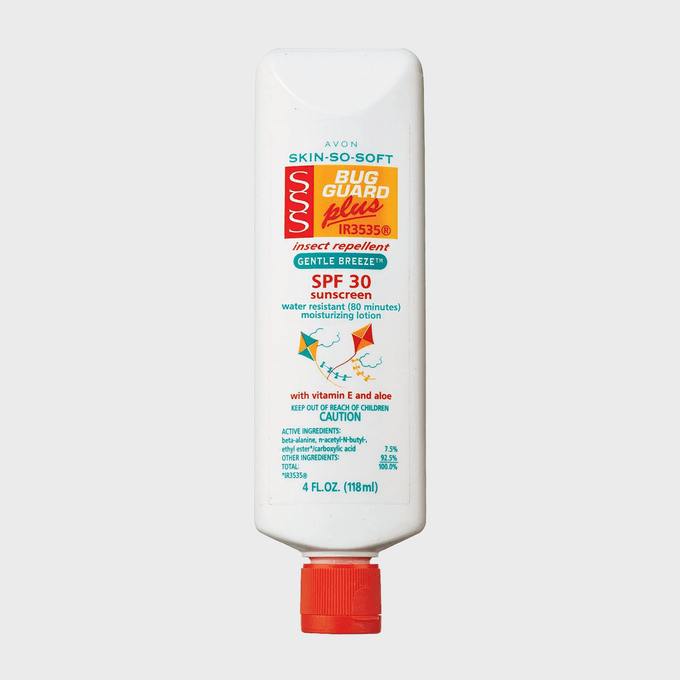
Heading outdoors means needing both bug and sun protection, which is exactly why Avon Skin-So-Soft SPF 30 with Bug Guard is a perennial favorite for so many adventurers. The DEET-free, PABA-free formula is safe for the entire family and works hours to protect against the elements. With Vitamin E and aloe, the formula softens and smooths skin, too. If you do manage to get bitten, you can always use a Bug Bite Thing to reduce swelling and itching.
Pros:
- SPF 30 and mosquito repellent combined in one product
- Hydrating, non-greasy formula
- Ideal for a variety of warm weather uses ranging from sports to days by the lake
- Affordable price
Cons:
- Combining SPF with bug repellent slightly dimities the protective qualities of each, so you don’t necessarily get the strongest sunscreen or mosquito repellent
Best mosquito repellent patches for children
BuzzPatch Mosquito Stickers
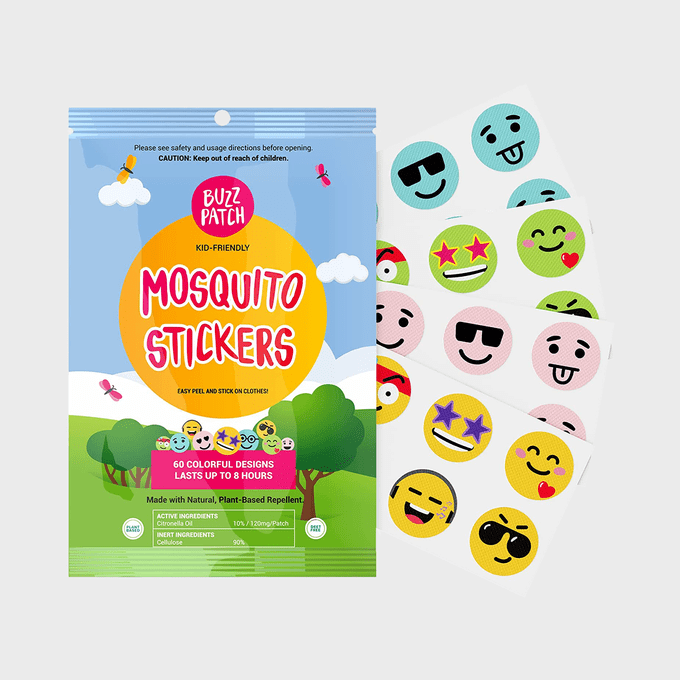
Kids love the cute designs and easy-to-apply delivery of BuzzPatch Mosquito Stickers. Each package contains 60 DEET-free, non-toxic stickers treated with citronella essential oils that naturally deter a variety of bugs. It’s one of the best mosquito repellent options for those with sensitive skin, young children and those who just love having a little extra summer fun.
The stickers are most effective for the first eight hours of wear but can offer gentler protection for up to 24 hours. Don’t worry about them falling off, either. They’re made with medical-grade adhesive that’s similar to bandages.
Pros:
- Fun printed sticker application kids love
- DEET-free formula made with real citronella oil
- Safe for sensitive skin types
- Effective for up to 24 hours
- Affordable and easy to pack in travel bags
Cons:
- They can loosen with swimming, bathing or excessive sweat
Best mosquito repellent bracelets
Cliganic Mosquito Repellent Bracelets
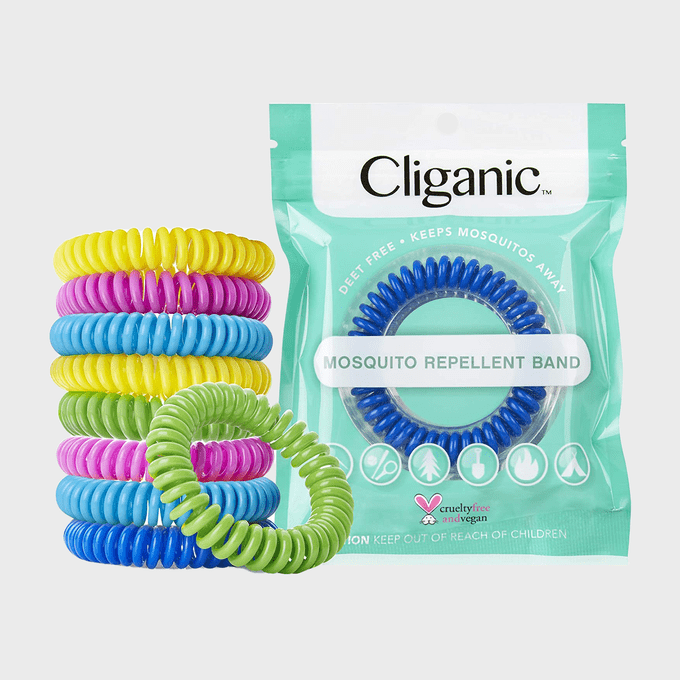
Campers, runners and playground enthusiasts can’t say enough good things about these Cliganic Mosquito Repellent Bracelets that come in handy packs of 10. They’re colorful, waterproof and DEET-free thanks to an infused coil-style design that features a variety of bug-deterring essential oils. Reviewers love the stretchy, one-size-fits-most size that works on both children and adults, and the included resealable bags to extend each bracelet’s lifespan.
Pros:
- Wearable DEET-free mosquito repellent
- Fits most wrists (or ankles) thanks to a stretchy design
- Colorful
- Reusable
- About $1 each
Cons:
- These essential oils-based units only offer mild protection and are best suited to be worn in pre-treated areas or combined with other measures
Best eucalyptus-based mosquito repellent
Murphy’s Naturals Lemon Eucalyptus Oil Insect Repellent Spray
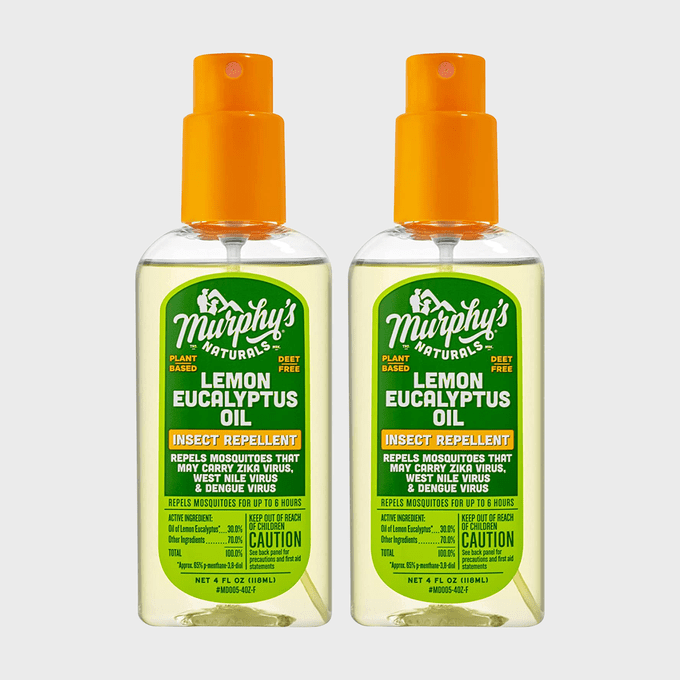
Everyone knows about citronella oil, but few realize that eucalyptus is one of the best mosquito repellent options for those seeking gentler, all-natural deterrents. Each bottle of Murphy’s Naturals Lemon Eucalyptus Oil Insect Repellent Spray contains an invigorating combination of real lemon and eucalyptus essential oils. The combination helps repel mosquitoes and other bugs for up to six hours in a DEET-free, permethrin-free way that reviewers say makes them feel “safer than ever.”
Pros:
- Natural lemon and eucalyptus essential oils repel mosquitoes and other bugs for up to six hours
- Invigorating spa-like scent
- DEET- and permethrin-free formula
- Easy to apply
- Over 1,800 Amazon ratings and an impressive 4.5-star average
Cons:
- Limited six-hour protection means frequent reapplications if you plan to be outside all day
Best mosquito repellent blanket
Live Outer Bug Shield Blanket
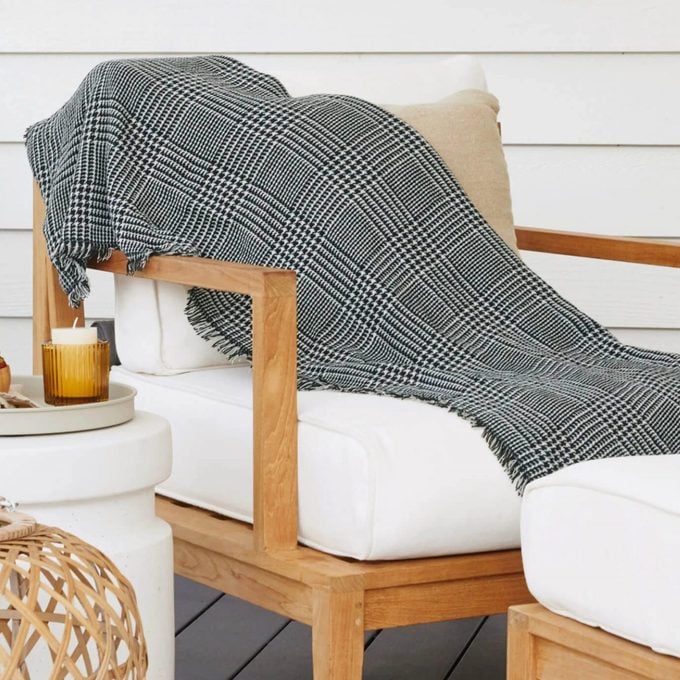
Adding a Live Outer Bug Shield Blanket to your list of campfire essentials is a smart move. It looks and feels like high-end luxury throws but features hidden mosquito repelling technology that elevates your time outdoors. Each piece is treated with invisible, odorless Insect Shield technology that comes with the EPA’s approval. It’s proven to repel pesky mosquitoes, ticks, fleas, flies, ants, chiggers and other bothersome bugs.
Pros:
- Soft throw blanket with built-in Bug Shield technology
- Permethrin-treated material lasts up to 70 washes
- High-end, catalog-worthy designs
- Perfect for evenings on the patio, cozy campfires and sleeping under the stars
Cons:
- It’s pricy compared to sprays and other bug repellant products
Best mosquito repellent for tents and camping gear
Sawyer Premium Permethrin Insect Repellent
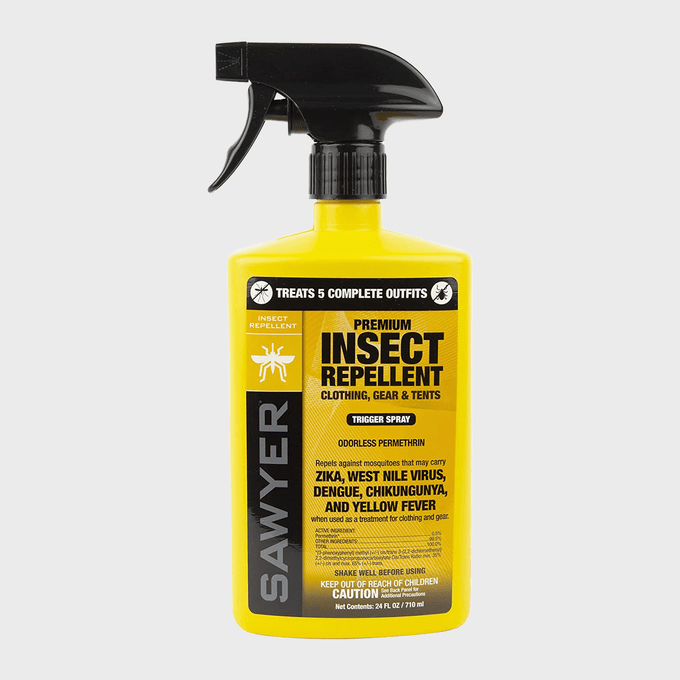
Wearing mosquito repellent tees, bracelets and stickers might not be enough if you’re camping in swampy or forested areas. Adding a few bottles of Sawyer Premium Permethrin Insect Repellent to your arsenal can make all the difference between a positive camping experience and an all-out bite fest. Use it to spray down tents, chairs, sleeping bags and gear to mosquitoes and other bugs away in the first place. The larger-format spray is more similar to a bottle of window cleaner, so you can cover larger areas in less time.
Pros:
- Ideal for spreading mosquito-stopping permethrin across camping gear and tents
- Easy larger-format spray bottle
- Non-aerosol
- Treats fabrics for up to six weeks or six washes—whichever comes first
Cons:
- Designed to work on fabric, not skin
- Trigger bottle covers large areas, so it’s not ideal for tiny detailed crevices and corners
Best essential oil mosquito repellent
UpNature Citronella Essential Oil
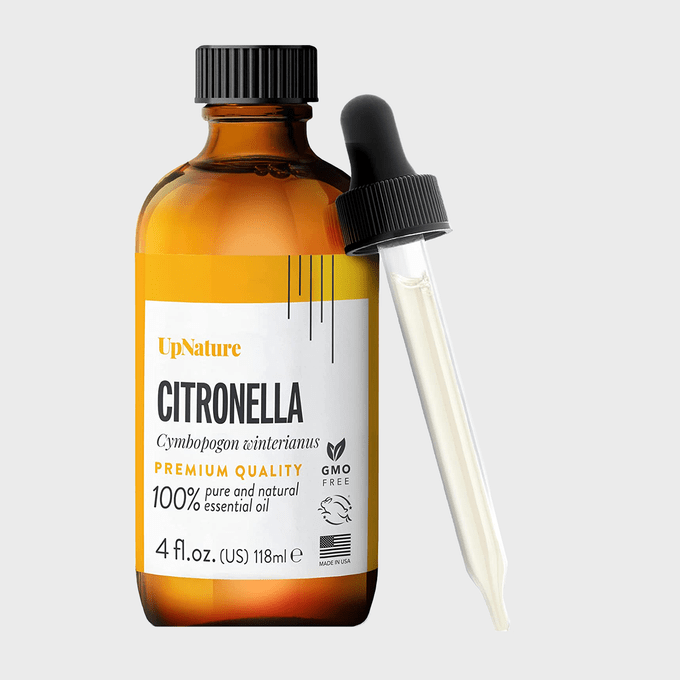
DIYers love UpNature Citronella Essential Oil for its easy blending and near-endless uses. Some add it to essential oil diffusers for smoke-free, flame-free citronella bug repelling. Others add small amounts to their favorite lotions and hair products for all-natural, DEET-free bug repelling that offers a subtle scent.
“I love it! I reorder this same oil a lot,” says verified purchaser Julie. “It smells amazing and it’s great to keep the mosquitoes away. I use it with my oil diffuser every day.”
Pros:
- Versatile pure essential oil format
- All-natural citronella oil offers DEET- and permethrin-free protection
- Can be added to diffusers, body and skin products and homemade candles
Cons:
- Best suited for those who are already familiar with essential oils and how to use them properly
Best all-natural mosquito repellent for yards
Wondercide Flea & Tick Yard Spray
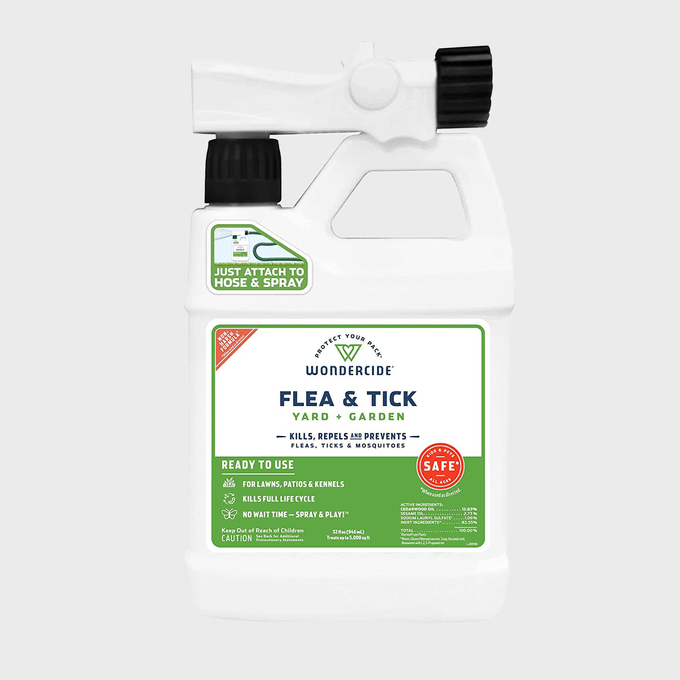
Don’t let the name fool you—this do-it-all bottle of Wondercide Flea & Tick Yard Spray also repels mosquitoes with gusto. Instead of DEET or permethrin, the formula relies on family- and pet-safe essential oils and is totally free of harsh chemicals. No artificial colors, fragrances or harmful pesticides are included in the formula, and a single bottle can treat up to 5,000 square feet of lawn in a matter of minutes. It uses a targeted group of essential oils and ingredients that won’t harm beneficial bugs like honeybees, and that’s something Amazon reviewers are especially enthusiastic about.
Darrin, a verified Amazon purchaser, writes: “On the first application, we saw a very small difference in the number of mosquitoes. The second application made a HUGE difference. Three weeks later, I applied the third treatment and have not seen a mosquito since. I fully believe this product is a lifesaver.”
Pros:
- All-natural and safe for both humans and pets
- One of the only all-natural yard sprays on the market designed to repel a variety of insects including mosquitoes
- Won’t harm beneficial bugs like honeybees
- Safe for plants and flowers
- Easy to use
- Light, invigorating scent
Cons:
- Depending on your yard’s conditions, you may need two to three treatments to see desired results
Best indoor mosquito repeller
Amish Iron Ultrasonic Pest Repeller
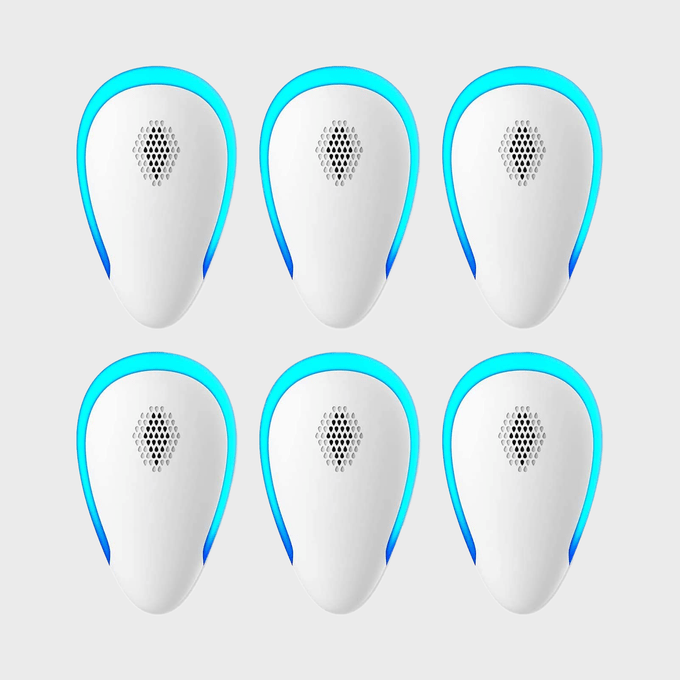
Mosquitoes can also be a problem indoors, especially if you like to leave doors and windows open on nice days. The Amish Iron Ultrasonic Pest Repeller System uses low-frequency waves to distribute pest-repelling and -killing technology that won’t harm humans. It only requires a few minutes of operation each day to treat active infestations and can handle areas of up to 1,600 square feet. It comes in a single pack or a set of six that’s ideal for larger homes.
Pros:
- Uses low-frequency ultrasonic waves to kill and repel bugs including mosquitoes
- Easy plug-in use
- Can handle areas up to 1,600 square feet
- Only requires a few minutes per day to work
- Comes in single or six-packs
- Safe for humans
- Mess-free
Cons:
- The ultrasonic waves can’t penetrate most walls, meaning you’ll need one for each room
Best mosquito repellent lotion
Ultrathon Insect Repellent Lotion
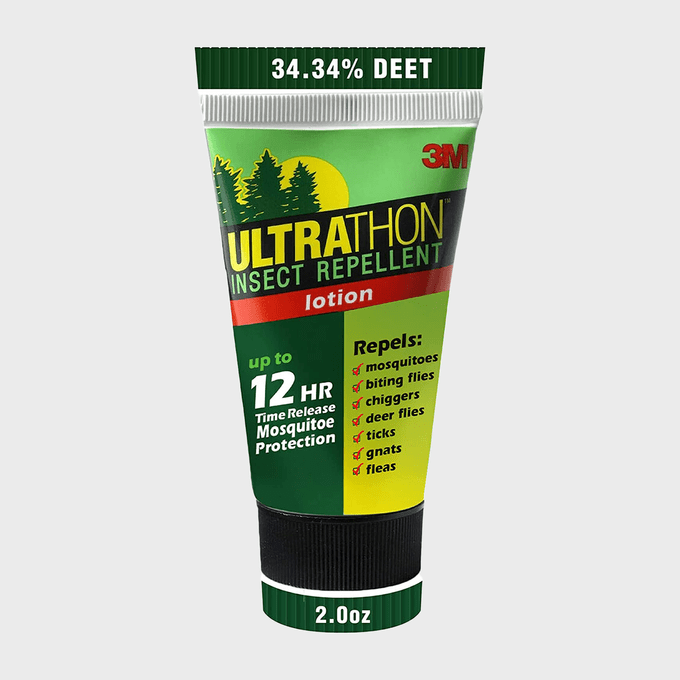
If you prefer a lotion formula, Ultrathon Insect Repellent Lotion is easily one of the strongest and best mosquito repellents available. The 34% DEET concentration makes this a bringing-out-the-big-guns pick that’s best suited for wading through swamps, sitting by ponds, hunting and camping deep into the woods. The built-in controlled release technology provides a continuous shield of bug protection that lasts up to 12 hours.
“This stuff is amazing! I was in Big Cypress and Everglades parks during a mosquito invasion,” writes verified purchaser Nicole. “I’m a native Floridian and these mosquitoes were nuts. I used this product along with a mosquito jacket (yes that’s how bad they were) and never got a bite.”
Pros:
- Smooth lotion application
- Extremely high concentration of DEET at over 34%
- Works in the toughest, swampiest and wooded areas for up to 12 hours
- Affordable price
Cons:
- The high concentration of DEET isn’t ideal for those with sensitive skin or concerns over synthetic chemicals
- The product can separate in high temperatures, but can be shaken to reconstitute
Best mosquito zapper
Gootop Mosquito Zapper
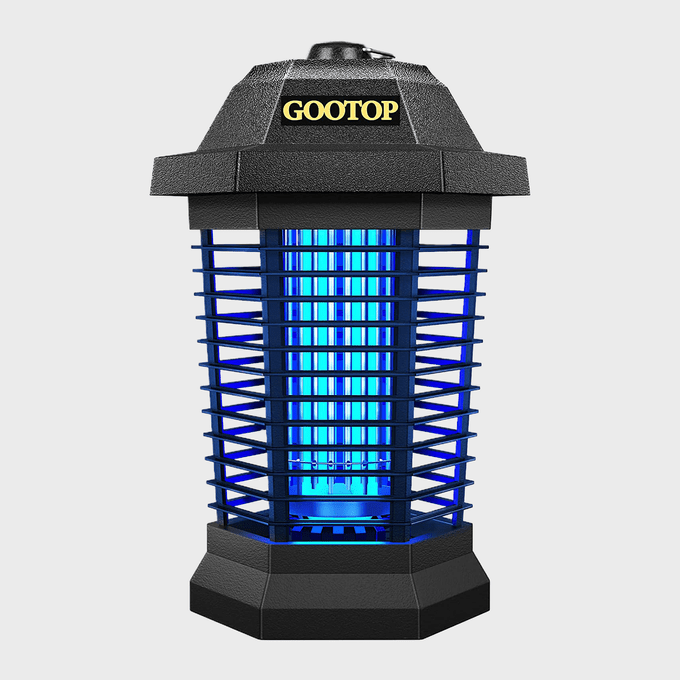
While the Gootop Mosquito Zapper isn’t necessarily an insect repellent, it sure will attract and kill the ones that come your way. It’s Amazon’s top-selling bug zapper thanks to blue-violet light that attracts mosquitoes and flying insects. The bugs are then electrocuted by the high-voltage grids. This offers an efficient mosquito control system without added chemicals, although it is a little gruesome.
Ernestine, a verified Amazon purchaser writes, “This works extremely well. It zaps mosquitos and flies fast. We open the patio door several times during the day for our cat to go into the yard. Bugs fly in and hide until the sun goes down and then they seek out people to bite. The device has reduced bug bites and the humming of mosquitos and biting flies. Great investment—glad I bought two.”
Pros:
- Uses blue-violet light to attract and zap bugs
- No added chemicals or scent
- Easy, fast setup
- Over 2,000 Amazon ratings and a nearly-perfect 4.4-star average
Cons:
- The pest-eliminating process can be gruesome compared to other methods
Source:
- Tania Elliott, MD, internist, allergist and immunologist